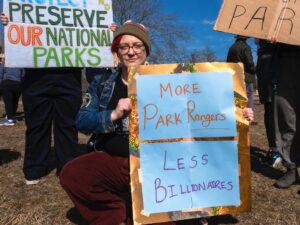WELLFLEET — A court order has reinstated three full-time Cape Cod National Seashore employees who were terminated by the Park Service on Feb. 14. Their return to work, however, may be only temporary.

The reasons are complicated and include an April 8 U.S. Supreme Court ruling favoring an appeal by the Trump administration’s Justice Dept. of a U.S. District Court decision.
The order that brought the Seashore workers back was issued on March 14 by U.S. District Court Judge William Alsup, who has served in the Northern District of California since 1999. It compelled the Dept. of the Interior (DOI) and five other federal agencies to reinstate all probationary employees who had been terminated in February. (The National Park Service is a bureau within the DOI.)
That same day, March 14, a second ruling by U.S. District Court Judge James Bader in Maryland ordered the rehiring of probationary employees of 18 agencies, including the DOI.
The three who had been fired at the Seashore were archaeologist Daniel Zoto; ranger John Hanlon, who served in a dedicated outreach position; and restoration ecologist Kyrsten Boswell, who works closely with the Herring River Restoration Project.
Two weeks ago, Hanlon and Boswell told the Independent that they had been reinstated and had returned to work. Zoto referred a reporter to Seashore Public Information Officer Linzy French, who in turn referred the newspaper to the NPS Office of Public Affairs. That office confirmed by email on March 27 that all terminated employees had been reinstated and would receive back pay — “as the White House pursues its appeals process.”
Acting Solicitor General Sarah Harris, appointed by the president in January, had filed that appeal on March 24, asking the Supreme Court to stay the district court’s order. That appeal appears to have succeeded in pausing Judge Alsup’s order.
Alsup cited a lack of proper procedure. The termination emails, including those received by Boswell, Hanlon, and Zoto, claimed they were being fired because they “have failed to demonstrate fitness or qualifications for continued employment because your subject matter knowledge, skills, and abilities do not meet the Department’s current needs.” Alsup found that some who were terminated had received glowing evaluations or had never been evaluated.
“It is sad, a sad day, when our government would fire some good employee and say it was based on performance when they know good and well that’s a lie,” Alsup said from the bench before issuing his ruling.
Many who were rehired had long work histories with the Parks, having served as seasonal employees before being promoted into their jobs, said Kristen Sykes, northeast regional director of the National Parks Conservation Association.
In its appeal, the government argued that the plaintiffs — a coalition of unions and nonprofits — did not have standing to sue the government because they would not be sufficiently affected by the terminations. The Supreme Court agreed in a two-paragraph order.
Now, the only ruling that is keeping those employees from being terminated again is Judge Bader’s. Its scope is limited to 19 states, including Massachusetts, but the administration is fighting it. On March 14, White House Press Secretary Karoline Leavitt called Bader’s order “absurd and unconstitutional” and said that the Trump administration would challenge it.
Reductions in Force
Even if Judge Bader’s ruling stands, the DOI could still fire these employees again. Bader noted in his ruling that the government could conduct a “reduction in force” but would have to give states advance warning.
The government is preparing such a reduction in force now. A Feb. 11 executive order required all agency heads to develop reduction plans by March 13, and according to a March 10 report in The Hill, Park Service managers were told to outline a plan to reduce the service’s payroll by 30 percent, and terminations would focus on permanent employees.
Sykes said that National Park managers have been asked to submit lists of employees and vacancies in preparation for a possible reduction in force. Exactly how or when those lists will be acted on remains uncertain. “There’s very little information coming out of Washington, D.C. of what those impacts will be and how many staff will be let go,” she said.
David Bernstein, president of the Friends of the Cape Cod National Seashore, said that a 30-percent reduction at the Seashore would affect maintenance, tours of Park properties, and public safety. He also said that seasonal staff such as lifeguards and rangers could be affected, too, if full-time supervisors are not available to manage them.
The Park is already about seven employees short of its recommended staffing level, Bernstein said. If the 30-percent reduction is in addition to those seven, “then it’s going to hurt us a lot.”
Bernstein said that park staff are anxious about how far the firings might extend, with some full-time rangers nervous about whether they’ll be let go. “Some say there’s no way they can run the Park if they keep firing people,” he said.
Bernstein said he doesn’t see how the Park could remain open with that kind of reduction in staffing. But Doug Burgum, who became secretary of the interior on Feb. 3, ordered on April 4 that all Parks must remain open, regardless of staffing levels.
Sykes applauded the probationary workers who returned to their jobs. “They were so dedicated to the work that they were doing … that they wanted to come back, even if there’s uncertainty for the longevity of the position,” she said.
Hanlon, Boswell, and Zoto declined to speak further about their reinstatement.
Bernstein said that staff are under strict orders not to talk about the situation. “I think they want to draw as little attention to the three people as possible,” he said, “hoping that when the time comes, they’ll be forgotten about.”



